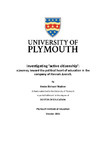Investigating ‘active citizenship’: a journey toward the political heart of education in the company of Hannah Arendt.
| dc.contributor.supervisor | Haynes, Joanna | |
| dc.contributor.author | Walker, Kevin Richard | |
| dc.contributor.other | Plymouth Institute of Education | en_US |
| dc.date.accessioned | 2022-10-20T09:19:38Z | |
| dc.date.available | 2022-10-20T09:19:38Z | |
| dc.date.issued | 2022 | |
| dc.identifier | 725530 | en_US |
| dc.identifier.uri | http://hdl.handle.net/10026.1/19712 | |
| dc.description.abstract |
The formation of ‘active citizens’ has become a desirable educational outcome in mainstream secondary and adult education in the UK. However, there is a wide range of interpretations regarding what being ‘active’ as a citizen actually involves and a lack of consensus on the role of education in this process. Drawing on Arendt’s conception of action as the basis of political activity where “to be free and to act are the same” (Arendt 1968a: 153), I propose an understanding of ‘active citizenship’ which involves the appearance of an individual citizen in relationship with the shared public world. It is argued that this relationship is where education and politics meet, and that the nature of educational practice can have a significant impact on that. I propose, following Hannam (2016), that “bringing the child to human togetherness: to action in plurality” (128) is a helpful way to understand an educative process that enables a political dimension to emerge in the public space of a classroom. Examples, from a range of educational settings, are used to explore what this means in practice. It is argued that the cultivation of an ‘embedded reflexivity’, as a form of reflective practice, enables educators to become more aware of the potential for freedom and political action in their endeavours. A unique feature of this study is the storying methodology, which draws on Arendt’s political hermeneutic phenomenology (Borren 2010, Van Manen 2014). Whereas Arendt used historical and contemporary events to examine and illustrate her concepts, I use narratives from my professional practice as an educator in both secondary and adult sectors. It is asked of each activity to what extent it enhances the “task of renewing a common world” (Arendt 1968b: 196). This thesis makes a distinctive contribution to the application of some of Arendt’s ideas to conceptualise the challenge of education for an engaged, active citizenry. It also provides provocative illustrations across a variety of contexts. Arendt’s exhortation to “think what we are doing” (Arendt 1998: 5) is embodied here through the examination of the practice of one educator, with the intention to reach out to many. | en_US |
| dc.language.iso | en | |
| dc.publisher | University of Plymouth | |
| dc.subject | Hannah Arendt | en_US |
| dc.subject | Active Citizenship | en_US |
| dc.subject | Citizenship Education | en_US |
| dc.subject | Active Citizen | en_US |
| dc.subject | Active Citizens | en_US |
| dc.subject | Political Education | en_US |
| dc.subject.classification | Other (e.g., MD, EdD, DBA, DClinPsy) | en_US |
| dc.title | Investigating ‘active citizenship’: a journey toward the political heart of education in the company of Hannah Arendt. | en_US |
| dc.type | Thesis | |
| plymouth.version | publishable | en_US |
| dc.identifier.doi | http://dx.doi.org/10.24382/554 | |
| dc.identifier.doi | http://dx.doi.org/10.24382/554 | |
| dc.rights.embargoperiod | No embargo | en_US |
| dc.type.qualification | Doctorate | en_US |
| rioxxterms.version | NA |
Files in this item
This item appears in the following Collection(s)
-
01 Research Theses Main Collection
Research Theses Main


